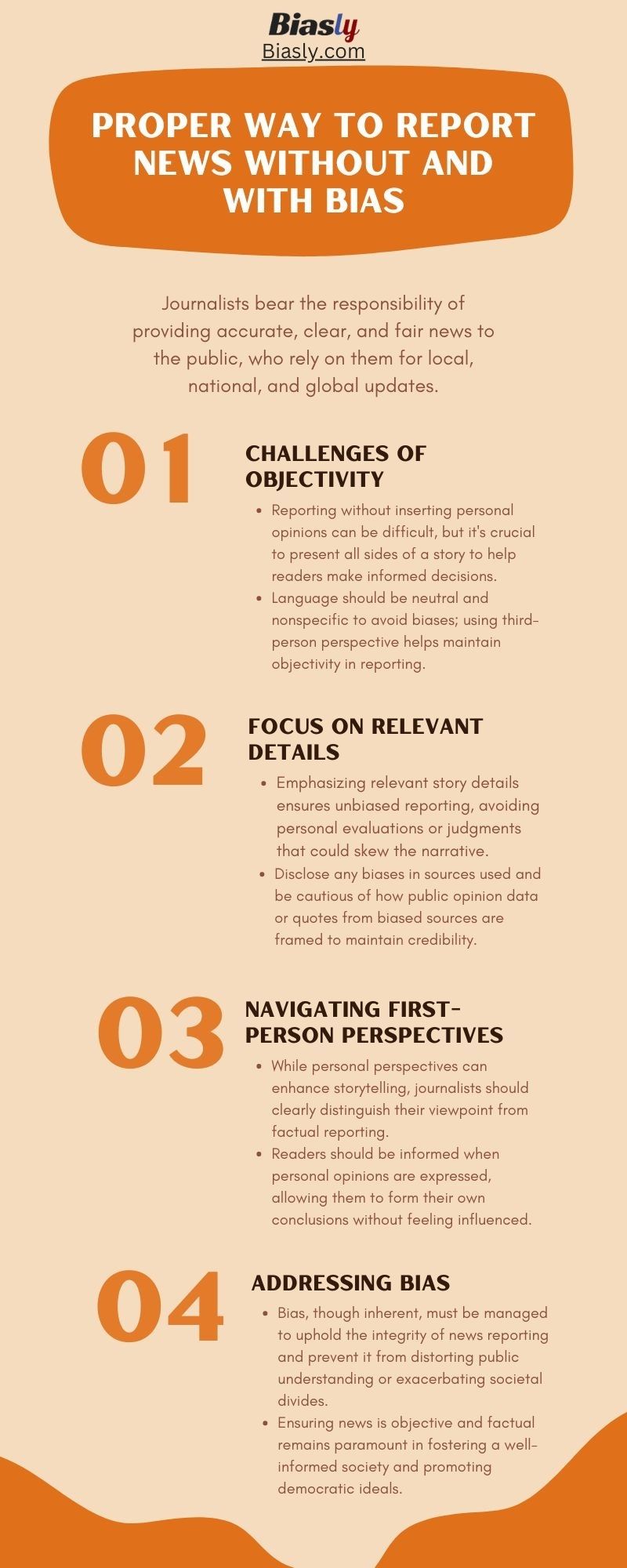
Journalists do their best to report honestly- they know that the public relies upon them to be connected to local, national, and worldwide news in an accurate way. The public trusts that journalists will be honest with them and assumes that journalists report the events of the world on accurate, clear, and fair terms. While journalists strive to be as non-partial in reporting, as human beings, it can be difficult to omit one’s personal opinion from reporting. Proper reporting is essential: Laying out all sides of a story so that readers get a feel for what’s going on and can make better decisions is a popular journalistic tradition. Reporting without inserting one’s own political and personal beliefs can be a challenge, but there are ways that one can report the news in a bias-free and accurate way.
Be Mindful of Language
When writing, personal feelings don’t just magically go away. Writers must ensure that they are aware of their own personal biases and put them aside when reporting on events, social issues, and policy. Being mindful of the language one uses when writing about current events is fundamental to making sure news is unbiased. Language should be nonspecific and not sensitive to labels. If one side uses one phrase or word to refer to something and the other uses something else, a writer should note that and make the reader aware of the differences while also using a neutral term to refer to the idea, person, or policy . In addition, news reporters and writers should use a third-person point of view in order to maintain objectivity. While a third-person writing style is not an indicator that news is bias-free, it alerts the reader of some degree of objectivity in a way that the first-person point of view does not allow. Being specific when referring to people is also important. When describing public figures, journalists should not use descriptive adjectives and they should avoid using words that might have prejudicial connotations. For example, saying something about a “lofty statesman” puts a spin on the sentence that either “the statesman” alone or his name would not.
Focus on Relative Details of the Story
Similarly, focusing on relative details of the story is an important way to make sure one’s news remains unbiased. As with the example above, it doesn’t matter if the writer thinks the man is “lofty”, they should be focusing on what is most relevant to the story. What are his policies, and what do people think about them? An article doesn’t have to sound like “he said, she said”, but there should be different points of view reflected in an article on both sides, and if there aren’t, it should be disclosed to the reader that the article pertains only to the thoughts and opinions of one side. For example, if a journalist is reporting on only the Democrat’s response to what happened at the Capitol on January 6th, 2021, then the reader should be aware of that from the get-go.
Note Source Biases
When writing about events, journalists should be as detailed but straightforward about the matter. People want to know what’s going on, and the more descriptive the better, and the description should be free of personal feelings on the matter. Biases can also be present in the sources used. Journalists must be careful of the leanings and biases of the places they use to get their information. Additionally, when using public opinion in a piece, journalists should be wary of what they’re looking at. Surveys and polls from different organizations look for different things and perspectives, and the way that questions are phrased and in what order can change the meaning of a respondent’s answer. Additionally, when looking at books, past articles, or literature, journalists should be aware of the author’s background; some sources are not objective, and using a non-objective quote could add an unwanted spin to a news article.
Importance of First-Person Perspective
While bias can be detrimental in articles that are meant to be objective, biased articles are not completely unacceptable. Sometimes a journalist’s personal voice can add something to a piece; it can infuse a passion into it that might motivate, move, or aggravate a reader into a new point of view or solidify an old-held belief. Language, again, with this first-person perspective of the news is incredibly important. If one wants to be taken seriously when reporting with their own beliefs, they need to be incredibly precise in what they are talking about, describing surroundings, attitudes of people, and the way they perceive what’s happening around them. The reader should know this is the writer’s perspective about what they are witnessing and that should be explicitly mentioned. For example, if a reporter is in a war zone, they should make sure the reader knows that. “The destruction I’ve witnessed here today is enough to prove that this war is inhumane and unnecessary…” is enough that one knows that the journalist is reporting but also makes the reader aware that there is a personal opinion present in the piece, one that the reader is not obligated to agree or disagree with. When making nonobjective news stories, the writer should clearly have an opinion in mind, but they shouldn’t make any outward calls for the reader to join them in this position; if the reader makes it through the piece, they should be well informed enough to come to their own conclusion on the subject and the opinion at hand. Again, all that’s mentioned in objective reporting is just as important, if not more, in nonobjective reporting – the writer almost wants to seem more credible in this situation to make up for their own beliefs that permeate the piece.
Be Aware of Potential Biases
Bias is an irremovable part of life, but it is something that can be harmful to the consumption of news and can alter people’s view on a subject, event, policy, or person if present in a news article. While readers should be constantly alert to the potential of bias in the news that they consume, journalists should be actively taking steps to make sure that their reporting is as objective, factual, and honest as possible. Biases can be detrimental to one’s own critical thinking and understanding of the world around them, no matter how close to home that may be, and can lead to an increasing partisan divide. Making sure that people get fair and unbiased news is imperative to a well-informed public in a democracy- and that starts with research and writing.























